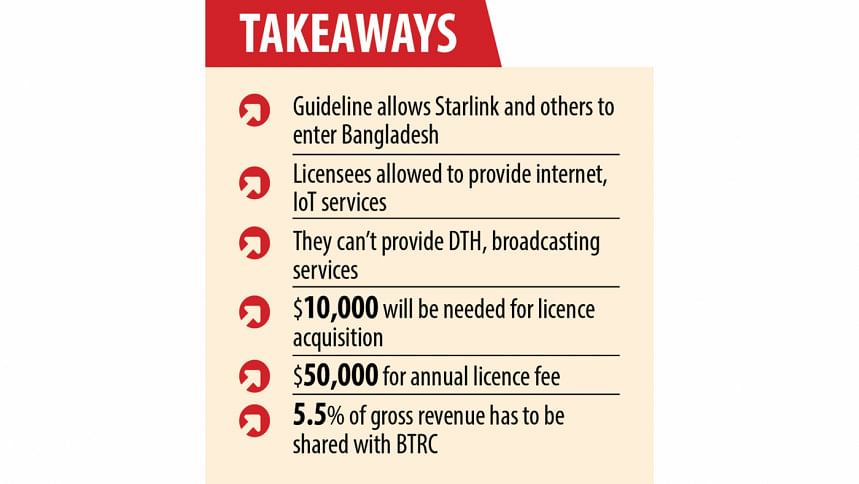Door may open for Starlink, others soon

The Bangladesh Telecommunication Regulatory Commission (BTRC) has drafted guidelines for satellite internet service operators, permitting wholly owned foreign companies to obtain licences -- paving the way for Elon Musk's Starlink and similar companies to enter Bangladesh.
The guidelines are titled "Regulatory and Licensing Guidelines for Non-Geostationary Orbit (NGSO) Satellite Services Operators in Bangladesh".
"To build, own, maintain and operate NGSO satellite systems and services, 100 percent foreign direct investment (FDI), foreign partnership, joint venture or investment from non-resident Bangladeshis is permitted," according to the draft.
In the case of foreign investment, the entity will be required to follow the government's FDI policy. Additionally, all rules, regulations and instructions from Bangladesh Bank, the Bangladesh Investment Development Authority (Bida) and other authorities will also be applicable.
This development comes just a week after officials of Starlink, which has been trying to enter the Bangladesh market since 2021, met with various authorities in Bangladesh, including officials of the BTRC and Bida.
According to the guidelines, the licence will be valid for five years.
It adds that the licensee is authorised to provide the following NGSO satellite services: broadband internet services, intranet services (domestic data communications), Internet of Things and machine-to-machine communication, earth station in motion service, earth exploration satellite service, remote sensing/meteorological services and any other services approved by the BTRC.
However, operators are not authorised to provide direct-to-home services, broadcasting services, satellite IMT-based services or telecommunications services.
The application/processing fee has been set at Tk 5 lakh, with an acquisition fee of $10,000 and an annual fee of $50,000. Additionally, an annual station/terminal fee per terminal is set at $20.
The licensee will also have to share 5.5 percent of its annual audited gross revenue with the BTRC. Another 1 percent of the gross revenue must be paid as part of the "contribution to space industry development and management".
The licensee must establish at least one gateway system within Bangladesh before commencing services. However, the BTRC encouraged the licensee to establish additional gateways.
Any user terminal placed within Bangladesh's geographical boundary must be authenticated and served through this local gateway. All traffic from these terminals must be routed through this local gateway for services within Bangladesh, according to the draft.
The NGSO gateway shall connect to international internet gateways to handle international internet data traffic.
The licensee must preserve internet protocol detail records, transaction detail records, call detail records (CDR), system logs or audit trails related to CDR changes and network traffic data for a period of one year for scrutiny or as directed by the commission or as required by the National Telecommunication Monitoring Centre under the law.
NGSO satellites are not stationary relative to the Earth's surface; they orbit the Earth at a lower altitude and faster than geostationary satellites.
Among the biggest companies vying for the market is SpaceX, which provides satellite internet coverage to more than 60 countries, with approximately 4,519 Starlink satellites currently in orbit.
The British company OneWeb has also launched a few hundred satellites into space. Jeff Bezos, the founder of Amazon, is also expanding into such ventures, with plans to launch over 3,200 satellites in the coming years to provide global internet coverage.
However, the cost of the technology is prohibitively high in the context of Bangladesh.
For example, Starlink's services are priced at approximately $120 per month for home users, with initial hardware costs ranging from $350 to $599, according to its website.
In contrast, local internet service providers in Bangladesh offer 5 Mbps broadband for about Tk 500 per month while mobile internet costs between Tk 400 and Tk 500 ($4 to $5) for 30GB of data.
Mustafa Mahmud Hussain, a telecom policy analyst, said Bangladesh will soon experience a transformative shift with the introduction of NGSO satellite internet.
"Expanding connectivity in remote, underserved areas can empower students, drive business growth, and strengthen community bonds," he said. "Achieving this vision calls for fewer bureaucratic hurdles and affordable pricing, with the BTRC's support as a catalyst for change."

 For all latest news, follow The Daily Star's Google News channel.
For all latest news, follow The Daily Star's Google News channel. 







Comments